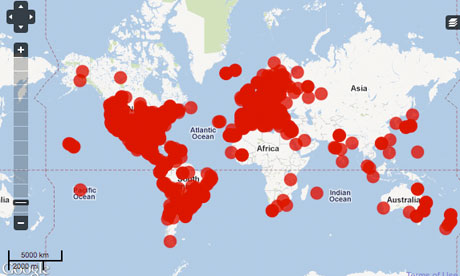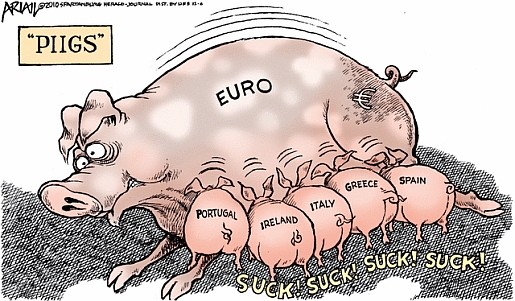The pulse
 In the
recent months, we`ve witnessed some tumultuous events going on in Europe. The
old continent is confronting an economic and social crisis, the likes of which
it hasn`t faced for the past 80 years, ever since the great depression of the
1930s.
In the
recent months, we`ve witnessed some tumultuous events going on in Europe. The
old continent is confronting an economic and social crisis, the likes of which
it hasn`t faced for the past 80 years, ever since the great depression of the
1930s.
The money has run out, as debt
of EU countries has reached unsustainable levels. Street protests and
riots start to resemble more and more full blown revolutions, as we`ve
recently seen in pictures of burning Athens.
The context (2008-2010)
 To put
things in context a bit: the 2008 crisis, which originated in the US, swept
throughout Europe, bringing a credit crisis, lack of economic growth, higher
levels of unemployment and uncertainty.
To put
things in context a bit: the 2008 crisis, which originated in the US, swept
throughout Europe, bringing a credit crisis, lack of economic growth, higher
levels of unemployment and uncertainty.
In the years
that followed, 2009 and 2010, spirits became animated, throughout the world, by
a so called “economic recovery”, which US Federal Reserve started by doing two
big QE(quantitative easing) programs, injecting cash liquidity into the
financial system to jump start the flow of credit to businesses, that in turn should
have generated job growth and consumption. The employed technique was similar to that of a
paramedic doing electroshocks on a car crash victim. However, what it managed
to achieve, was to just extend the patient`s agony, as year 2011 showed patient
was still very much agonizing in a coma.
The context (2010-2011)
Year 2011 culminated
with the Occupy Wall Street movement, which started on Wall Street, in New
York, US, but quickly spread to whole country and basically throughout the
world soon after. Core of the movement was made up by young disenfranchised individuals
with huge student loan debt. Unable to get jobs, in a sluggish growth
environment where most companies laid people off, shipping jobs overseas,
occupiers have taken their frustration on the Wall Street banking and financial
sector who was recipient of several government bailouts since the 2008 crisis
began. Movement spread to several US cities, sparking riots and clashes with
riot police. However, winter of 2011 came and Occupy movement entered in
hibernation mode, waiting to be resurrected
in the spring of 2012.

The Occupy movement spread as wide as South America, Europe, Australia and in Asia, marking the sign of these distressed economic times on a global scale.
In Europe,
many companies followed the US pattern, closing factories and outsourcing jobs
to stay competitive, laying off thousands of people on monthly basis.
Under these circumstances, a great number of
European countries have become unable to sustain themselves, as revenue
generated from taxes became lower and lower. The IMF (International Monetary Fund)
stepped in as a financier of last resort. However, the IMF is not in the
business of giving something for nothing, and asked in return harsh austerity
measures and cuts in government consumption, which basically means cutting
wages, sacking people, cutting state departments and so on.
 As IMF acted
more on the EU periphery, throwing a bone to the none Euro-zone countries in
Eastern Europe, the ECB (European Central Bank) took a direct role in helping
out Euro-Zone countries, those currently using the Euro currency, such as
Italy, Portugal, Greece, Ireland and Spain, also known as the infamous PIIGS (Portugal,
Italy, Ireland, Greece, Spain). They`ve chosen to do so, to save the European
monetary union, in an attempt to spread financial contagion. The help was given
indirectly by having the ECB buying government bonds of those afflicted
countries.
As IMF acted
more on the EU periphery, throwing a bone to the none Euro-zone countries in
Eastern Europe, the ECB (European Central Bank) took a direct role in helping
out Euro-Zone countries, those currently using the Euro currency, such as
Italy, Portugal, Greece, Ireland and Spain, also known as the infamous PIIGS (Portugal,
Italy, Ireland, Greece, Spain). They`ve chosen to do so, to save the European
monetary union, in an attempt to spread financial contagion. The help was given
indirectly by having the ECB buying government bonds of those afflicted
countries.
2011 was the
year of several deep budget cuts throughout Europe, lots of political shakeups
and street protest. Berlusconi, Italy`s prime minister, lost his decade long
grip on Italy, Greece`s Papandreou government having suffered same fate, both
being replaced with government of technocrats appointed by the EU Troika. As
these governments were politically unwilling or unable to impose fiscal
austerity measures, they were replaced by putting pressure on the political
parties in those countries. The ECB wanted to make sure their money would not
be wasted and real measures were going to be implemented.
The 2012 predicament – The two paths
 Year 2012 found
these newly elected governments, especially the one from Greece, led by Lucas
Papademous, unable to implement the needed austerity measures and cuts. Recent
riots in Greece have resulted in total chaos and the burning and looting of
museums as well as major corporate stores and several buildings throughout Athens. Greece,
unlike the other PIIGS countries can no longer be helped by buying their
government bonds, as their yields(or interest Greece government has to pay) has
skyrocketed to unsustainable levels. Greece currently receives aid packages
conditioned upon implementing harsh austerity measures. However, given the
looting and recent chaos in the country, it has become apparent, Greece may not
tolerate this level of austerity. A deep division between Angela Merkel(the
German leader) and the German financial minister(Wolfgang Schäuble), has
basically created two paths going further as follows:
Year 2012 found
these newly elected governments, especially the one from Greece, led by Lucas
Papademous, unable to implement the needed austerity measures and cuts. Recent
riots in Greece have resulted in total chaos and the burning and looting of
museums as well as major corporate stores and several buildings throughout Athens. Greece,
unlike the other PIIGS countries can no longer be helped by buying their
government bonds, as their yields(or interest Greece government has to pay) has
skyrocketed to unsustainable levels. Greece currently receives aid packages
conditioned upon implementing harsh austerity measures. However, given the
looting and recent chaos in the country, it has become apparent, Greece may not
tolerate this level of austerity. A deep division between Angela Merkel(the
German leader) and the German financial minister(Wolfgang Schäuble), has
basically created two paths going further as follows:
Optimistic (Schäuble): Greece defaults and EU union is strong
enough to take the hit
Pessimistic (Merkel): Greece defaults and
risks taking the whole EU monetary union
down with it
Optimistic (Merkel): Keep sending money to Greece, while
pressing them to implement deep cuts and austerity, thus avoiding a Euro Zone
meltdown and contagion.
Pessimistic (Schäuble): Keep sending money to Greece and
sustain the necrosis, risking death of the Union, instead of cutting the leg
and saving the body.
Total collapse or United States of Europe
However,
both of the above scenarios might result in a total collapse of the European
Union, as the money to keep buying PIIGS debt is just not there.
 In the
optimistic scenario
(if you can call it that), and if the above plans do work, Europe will be totally
reshaped, sovereignty taken away from EU countries, with a tight centralized
control imposed by Germany, the de factor leader of the European Union. Under
this scenario, all the important economic decisions will be taken by a central
European commission, while the European governments will have to act as
servants, executing the orders. Europe will become a federal state, following
the US model.
In the
optimistic scenario
(if you can call it that), and if the above plans do work, Europe will be totally
reshaped, sovereignty taken away from EU countries, with a tight centralized
control imposed by Germany, the de factor leader of the European Union. Under
this scenario, all the important economic decisions will be taken by a central
European commission, while the European governments will have to act as
servants, executing the orders. Europe will become a federal state, following
the US model.
Influential voices in Germany, such as the ex chancellor Gerhard Schroeder, have already called for a United States of Europe.
"The current crisis makes it relentlessly clear that we cannot have a common currency zone without a common fiscal, economic and social policy,"
"We will have to give up national sovereignty."
"From the European Commission, we should make a government which would be supervised by the European Parliament. And that means the United States of Europe."
 The
pessimistic scenarios
will bring about a total collapse of the Union, with grave economic repercussions,
compared to which the 2008 crisis will look like a mere a prelude or anemic appetizer.
The
pessimistic scenarios
will bring about a total collapse of the Union, with grave economic repercussions,
compared to which the 2008 crisis will look like a mere a prelude or anemic appetizer.
"May
you live in interesting times" is an old and curios Chinese curse
which brings this whole political debacle to a new level of understanding.



No comments:
Post a Comment